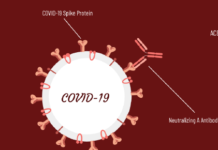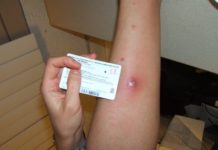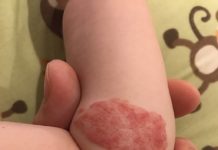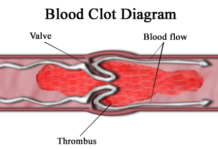by Leah Williams and Alexis Staples; Farnsley Middle School (Louisville, KY)
Christi Phipps was diagnosed with Lupus and it has changed her life.

“I now have to take medicine every day, and I can only eat certain foods,” Phipps states. “I now experience back and chest pains daily. “ Phipps was diagnosed at the age of 43 and she is now 44.
According to Alexis Staples, Phipps’ niece, she first noticed that her aunt was no longer as playful as she used to be. She did not go outside as much because too much sun exposure is not healthy for her. When Phipps was diagnosed it affected the people around her. Everybody was very worried about her.
“I am always worried about my sister, and I’m always stressed out because of her situation,” says Miranda Dillander. “I always have to make her go to her appointments because she never wants to go.”
According to The Lupus Foundation of America, about 1.5 million Americans and about 5 million people worldwide have a form of Lupus. No two forms of Lupus are alike. Some cases are more severe than others.
Some symptoms of lupus are shortness of breath, fingers and toes turning blue when exposed to cold or during stressful times, chest pains, dry eyes, confusion and memory loss, stiffness and joint pain, fatigue and fever, sores inside mouth and nose, and a face rash that resembles butterfly wings across the mid face area. Phipps experiences shortness of breath, chest pains, and stiffness and joint pain.
Someone diagnosed with Lupus is most likely between the ages of 15 and 40. Lupus is more common in African Americans, Hispanics, Asians, and women. In Fact, 90% of Lupus patients are women. But, anybody can get Lupus. Phipps is a white female. Lupus is not hereditary; only about 5% of children born to Lupus patients will develop Lupus. Over 16,000 new cases of Lupus are reported regularly across the country.
According to Mayo Clinic, Lupus is not contagious at all. It is an inflammatory disease that occurs when a body’s immune system attacks its own tissues and organs. Inflammation caused by lupus can affect different body systems, such as, joints, skin, kidneys, blood cells, brain, heart, and lungs. Patients with lupus have an overactive immune system.
The cause for Lupus in most cases is not known and there is no cure, but medications could help take care of some symptoms. According to The Lupus Foundations of America, some medications for lupus are Aspirin and Tylenol, which both are anti-inflammatory medications. Another medication used for treatments is corticosteroids, which is a synthetic prescription drug designed to work like the bodies naturally occurring hormones. Phipps takes steroids and anti-inflammatories.
Some recommendations for lupus partients are seeing your doctor regularly, getting regular exercise, not smoking, and eating a healthy diet. According to Phipps’ doctor, if she continues to see her doctor regularly, take her medications and keep up with a healthy diet, then she will live as long as she would if she didn’t have Lupus.
“I am doing well,” she says, “but I always have really bad pain.” Leah Williams Alexis Staples

This work is licensed under a Creative Commons Attribution-NonCommercial-NoDerivs 3.0 Unported License














it looks like you guys put a lot of work into this article. GOOD JOB
#best #article #ever